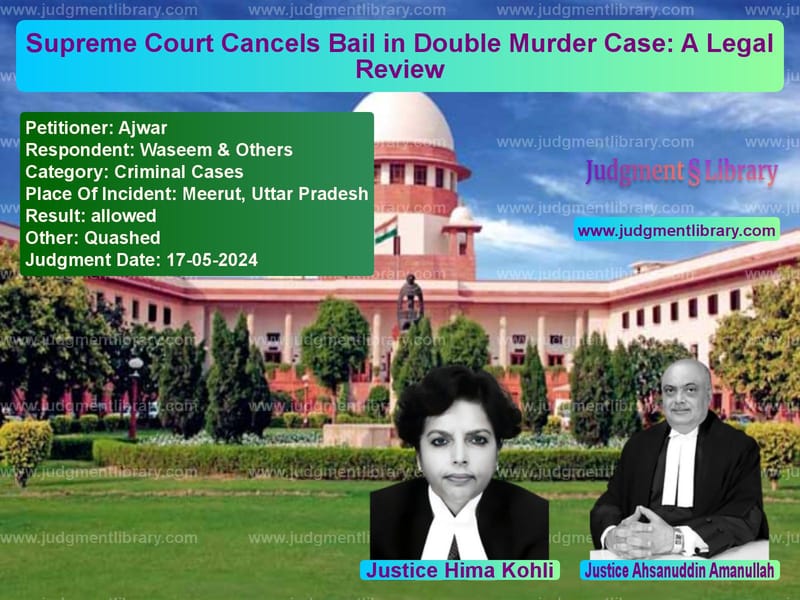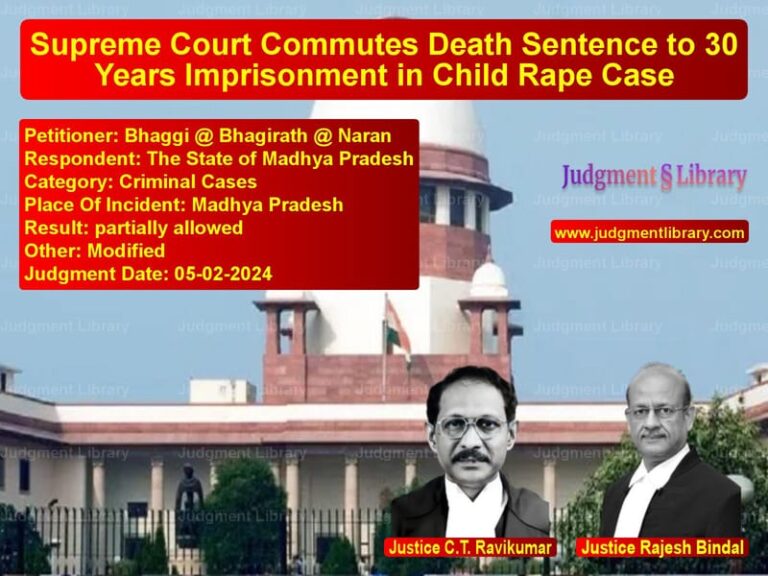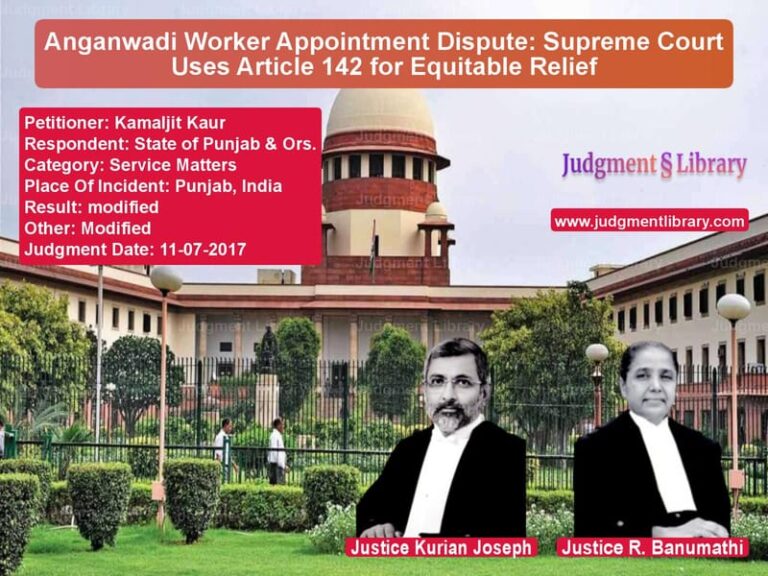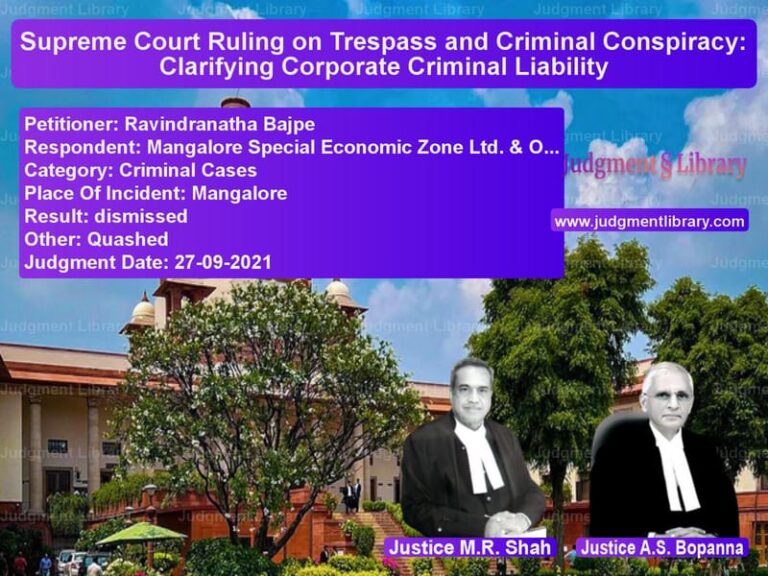Supreme Court Cancels Bail in Double Murder Case: A Legal Review
The case of Ajwar vs. Waseem & Others involves a double murder case in which the Supreme Court set aside the bail granted by the Allahabad High Court to four accused individuals. The judgment, delivered on May 17, 2024, highlights the importance of considering the seriousness of the crime, the role of the accused, and the possibility of witness tampering when granting bail.
Background of the Case
The case originated from a brutal attack that occurred on May 19, 2020, at around 7:30 PM in Meerut, Uttar Pradesh. The complainant, Ajwar, was sitting with his two sons, Abdul Khaliq and Abdul Majid, along with some other individuals, preparing to break their fast during Roza Iftar. The accused, a group of ten men, allegedly opened fire indiscriminately at them. Both of Ajwar’s sons were killed on the spot, and his nephew, Asjad, suffered serious injuries.
The accused in this case were:
- Waseem
- Nazim
- Aslam
- Abubakar
- Gayyur
- Nadeem
- Hamid
- Akram
- Qadir
- Danish
The complainant alleged that there was a long-standing enmity between the two groups, which led to the attack. The police registered a case under Sections 147, 148, 149, 302, 307, 352, and 504 read with Section 34 of the Indian Penal Code. The investigation led to a charge sheet being filed on June 23, 2020, against eight accused individuals, including the four respondents in this appeal.
High Court Bail Orders and Supreme Court Intervention
The accused sought bail from the Allahabad High Court, which granted them relief on various dates:
- Waseem: Bail granted on December 7, 2022
- Nazim: Bail granted on February 13, 2023
- Aslam: Bail granted on March 2, 2023
- Abubakar: Bail granted on March 21, 2023
Aggrieved by these orders, the complainant, Ajwar, approached the Supreme Court, arguing that the High Court had overlooked crucial facts and granted bail without considering the severity of the crime.
Arguments by the Petitioner (Ajwar)
The petitioner’s counsel presented the following arguments:
- The attack was a premeditated act of violence that resulted in the death of two people.
- The accused had previous criminal records and posed a serious threat to the complainant and witnesses.
- The accused had engaged in witness intimidation, particularly against Abdullah (PW-2), who was attacked inside the court premises.
- The trial was being deliberately delayed by the accused through legal maneuvers.
- The High Court had failed to properly assess the gravity of the offense and had erroneously granted bail on the grounds of parity.
Arguments by the Respondents (Accused)
The accused countered these claims by stating:
- They had been falsely implicated due to political and personal enmity.
- They had cooperated with the investigation and had not attempted to tamper with evidence.
- The prosecution had failed to explain the injuries sustained by some of the accused.
- The trial was being delayed by both sides, not just the accused.
Supreme Court’s Observations
1. Failure of the High Court to Consider Gravity of the Offense
The Supreme Court noted that the Allahabad High Court had failed to properly assess the gravity of the crime. It stated:
“The High Court has completely lost sight of the principles that conventionally govern a court’s discretion at the time of deciding whether bail ought to be granted or not.”
2. Witness Tampering and Intimidation
The Supreme Court emphasized that key witnesses had been threatened and even physically attacked:
“There have been allegations that three of the accused-respondents herein have threatened one of the key eyewitnesses, Abdullah (PW-2), in open court, thrashed him, and threatened to kill him in the court premises.”
3. Criminal Antecedents of the Accused
The Court took into account that some of the accused had prior criminal records and had committed offenses while out on bail.
4. Deliberate Delay of the Trial
The Court found that the accused had repeatedly sought adjournments and filed transfer petitions to stall the proceedings.
Key Findings and Judgment
The Supreme Court concluded that the High Court had committed a serious error in granting bail without considering key factors such as:
- The severity of the offense
- The potential for witness tampering
- The accused’s criminal history
- The risk of absconding
The Court ruled:
“All four bail orders passed by the High Court are quashed. The respondents are directed to surrender within two weeks from the date of this order.”
Implications of the Judgment
This ruling has significant implications for criminal law:
- Stricter Bail Granting Criteria: High Courts must rigorously assess the gravity of offenses before granting bail.
- Protection of Witnesses: Courts will take allegations of witness intimidation seriously.
- Judicial Accountability: The Supreme Court has reaffirmed its power to review and overturn lower court bail orders.
- Timely Trial: Accused individuals cannot use legal loopholes to delay proceedings indefinitely.
Conclusion
The Supreme Court’s decision in Ajwar vs. Waseem & Others underscores the need for a thorough judicial approach when granting bail in serious criminal cases. By canceling the bail granted to the accused, the Court has reinforced the principle that bail cannot be granted lightly in cases involving heinous crimes such as double murder.
Petitioner Name: Ajwar.Respondent Name: Waseem & Others.Judgment By: Justice Hima Kohli, Justice Ahsanuddin Amanullah.Place Of Incident: Meerut, Uttar Pradesh.Judgment Date: 17-05-2024.
Don’t miss out on the full details! Download the complete judgment in PDF format below and gain valuable insights instantly!
Download Judgment: ajwar-vs-waseem-&-others-supreme-court-of-india-judgment-dated-17-05-2024.pdf
Directly Download Judgment: Directly download this Judgment
See all petitions in Bail and Anticipatory Bail
See all petitions in Murder Cases
See all petitions in Attempt to Murder Cases
See all petitions in Custodial Deaths and Police Misconduct
See all petitions in Judgment by Hima Kohli
See all petitions in Judgment by Ahsanuddin Amanullah
See all petitions in allowed
See all petitions in Quashed
See all petitions in supreme court of India judgments May 2024
See all petitions in 2024 judgments
See all posts in Criminal Cases Category
See all allowed petitions in Criminal Cases Category
See all Dismissed petitions in Criminal Cases Category
See all partially allowed petitions in Criminal Cases Category







